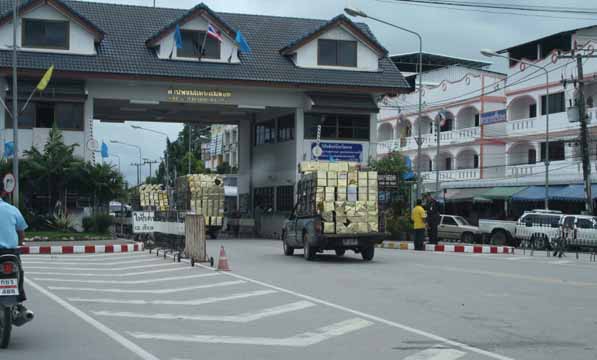Stranded in Midstream

The instability in question is the recent splintering of the DKBA, as elements within the group resist the BGF scheme even as its leaders—eager to expand their commercial operations after this year’s transition to nominally civilian rule—accept the plan. In early August, 1,500 troops led by Col Saw Hle Bwe broke away from the DKBA, raising regime fears of mass defections to the Karen National Union, which continues to resist Burmese military rule.
Another major source of concern for the junta is opposition to the election from radical dissidents based in Thailand, particularly in Mae Sot. A spate of bombings earlier this year—most notably a series of deadly explosions in Rangoon during Burmese New Year’s celebrations in April—has been linked to Mae Sot’s large and diverse exile community, which is known to include some former activists who have rejected the pacifist principles of the mainstream opposition in favor of more violent forms of resistance.
Meanwhile, as Burma’s military rulers look to secure the country’s borders ahead of the election, traders and migrant workers seek ways to work around the barriers thrown up by the junta’s tightening grip on the area. For some, this represents a unique business opportunity in itself.
“The border checkpoints around Mae Sot-Myawaddy are officially closed, but there are at least six where traders have reached an ‘understanding’ with Burmese officials, who allow them to ship their goods across at night,” said a Rangoon-based businessman who uses the Mae Sot-Myawaddy route to import used cars and other products from Japan.
Interestingly, the regime’s decision to halt border trade at Mae Sot-Myawaddy came as it was preparing to increase its sales of natural gas to Thailand. In late July, the Thai energy company PTT signed an agreement to purchase gas from Blocks M9 and M11 in the Gulf of Martaban, adding to its already substantial stake in the Burmese energy sector. According to the International Monetary Fund, in 2007, sales of natural gas to Thailand accounted for more than half of the junta’s revenue.
Thus, while border trade is held hostage to petty differences over construction projects and the Burmese regime’s obsessive need for control over ethnic minorities, cash continues to flow directly into the generals’ coffers through large-scale investment.
Like the supply of electricity in most parts of Burma, the flow of goods and services across the country’s borders—the economic lifeline of millions of ordinary Burmese—is switched on and off at will. Meanwhile, the generals enjoy uninterrupted access to the benefits of an “open” economy that remains firmly within its grip.
« previous 1 | 2 |
